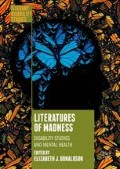Abstract
This chapter examines two novels that deal with the issue of mental illness and psychiatric disability in the Indian context, Amandeep Sandhu’s Sepia Leaves and Jerry Pinto’s Em and the Big Hoom. Drawing upon Arthur Kleinman’s model of resistance and suffering in the context of the lived, embodied experiences of patients, families, and caregivers, this chapter studies the struggle to construct meaning in a world that resists it. Both these novels offer readers complex narratives that bear witness to suffering, making a moving and powerful argument for listening and acknowledging the humanity of people dealing with disability and chronic mental illnesses, refusing to see them merely as patients or political actors with specific agendas.
Access this chapter
Tax calculation will be finalised at checkout
Purchases are for personal use only
Works Cited
Estroff, Sue. “Identity, Disability, and Schizophrenia: The Problem of Chronicity.” Knowledge, Power and Practice: The Anthropology of Medicine and Everyday Life, edited by Shirley Lindenbaum and Margaret Lock, University of California Press, 1993, pp. 247–86.
Gandhi, Mohandas. An Autobiography: The Story of My Experiments with Truth. Translated by Mahadev Desai, Beacon, 1993.
“India’s Mental Health Crisis.” The Editorial Board, New York Times, 30 Dec 2014. www.nytimes.com/2014/12/31/opinion/indias-mental-health-crisis.html. Accessed 15 June 2017.
Kleinman, Arthur. The Illness Narratives: Suffering, Healing and the Human Condition. Basic Books, 1988.
———. Writing at the Margin: Discourse between Anthropology and Medicine. University of California Press, 1995.
Nehru, Jawaharlal. The Discovery of India. Penguin, 2004.
Pinto, Jerry. Em and the Big Hoom. Penguin, 2014.
———. “India and the Right to Suicide.” New York Times, 28 Dec 2014. www.nytimes.com/2014/12/29/opinion/india-and-the-right-to-suicide.html. Accessed 15 June 2017.
———. “Introduction.” A Book of Light: When a Loved One Has a Different Mind, edited by Jerry Pinto, Speaking Tiger, 2016, pp. 7–25.
Sandhu, Amandeep. “My Mother’s Breast.” A Book of Light: When a Loved One Has a Different Mind, edited by Jerry Pinto, Speaking Tiger, 2016, pp. 36–54.
———. Sepia Leaves. Rupa, 2008.
Scott, James. The Weapons of the Weak. Yale University Press, 1985.
Author information
Authors and Affiliations
Editor information
Editors and Affiliations
Rights and permissions
Copyright information
© 2018 The Author(s)
About this chapter
Cite this chapter
Mallavarapu, S. (2018). Resistance, Suffering, and Psychiatric Disability in Jerry Pinto’s Em and the Big Hoom and Amandeep Sandhu’s Sepia Leaves. In: Donaldson, E.J. (eds) Literatures of Madness. Literary Disability Studies. Palgrave Macmillan, Cham. https://doi.org/10.1007/978-3-319-92666-7_11
Download citation
DOI: https://doi.org/10.1007/978-3-319-92666-7_11
Published:
Publisher Name: Palgrave Macmillan, Cham
Print ISBN: 978-3-319-92665-0
Online ISBN: 978-3-319-92666-7
eBook Packages: Literature, Cultural and Media StudiesLiterature, Cultural and Media Studies (R0)

